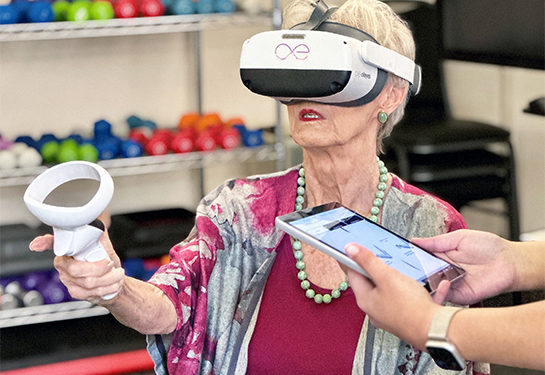Deep Brain Stimulation (DBS)
We use the latest minimally invasive procedures to place DBS devices. Our experts help relieve your symptoms and improve your quality of life.
Medically reviewed by David Brandman, M.D. on Aug. 26, 2025.

Advanced Symptom Relief
We understand how challenging it is to live with seizures or a movement disorder, and our goal is to bring you relief. We offer an in-depth evaluation to determine if deep brain stimulation (DBS) is the right treatment for you. If you are a candidate, DBS can provide symptom control to allow medication to be reduced or eliminated entirely.
Our surgeons have over 20 years of collective experience performing this operation safely and reliably. DBS is one of the many treatment options offered by our Parkinson's Foundation Center of Excellence and Comprehensive Epilepsy Center.
Our doctors, researchers, and other specialists work together to provide leading care for patients while also studying new and better ways to use DBS. Patients can take part in clinical trials offered by Neurology and Neurological Surgery to try the latest treatments being tested, such as DBS for mood or memory issues.
Deep Brain Stimulation Devices
A deep brain stimulation (DBS) device is like a pacemaker for your brain. It blocks electrical signals that cause seizures, tremors, or slow movements.
Your team will get to know you and discuss your options for DBS devices. We’ll help you understand the features of each device and which one may be right for you. We’ll explain how the surgery works and the benefits and risks.
Currently, we implant all FDA-approved DBS devices from Medtronic, Abbott and Boston Scientific. The batteries come in rechargeable and non-rechargeable options.
Request an Appointment
As Sacramento's No. 1 hospital, you'll benefit from unique advantages in primary care and specialty care. This includes prevention, diagnosis and treatment options from experts in 150 specialties.
Referring Physicians
To refer a patient, submit an electronic referral form or call.
800-4-UCDAVIS
Patients
Call to make an appointment.
Consumer Resource Center
800-2-UCDAVIS
DBS surgery requires two procedures. First, the neurosurgeon places the DBS electrodes in your brain. You will stay in the hospital overnight and go home the next day. After a week or two, you’ll have a short outpatient procedure where your neurosurgeon places the device battery and you go home the same day.
-

Before Surgery
You may need certain scans or tests in the days before the procedure. Your care team will tell you when to stop eating, drinking, and taking certain medications before surgery. Depending on what you decide with your surgeon, you may be asleep or awake for the procedure. If you stay awake, you’ll be alert but won’t feel pain because the area will be numbed.
-

During Surgery
We use minimally invasive techniques, which reduce the risk of complications and shorten your recovery time. DBS surgery may be performed with you awake or asleep. Based on your medical needs, the surgery team will recommend which method of surgery is preferred in your specific case.
-

After Surgery
After surgery, you’ll spend the night in the hospital so your team can support your recovery. We’ll explain the recovery process and what to expect. One to two weeks after DBS placement, you will have another procedure to place the battery.
Home Care
While you're recovering, you'll need to rest and avoid lifting heavy objects and driving for the first few weeks. After battery placement, we'll schedule an appointment to program your DBS.
Incision Care
Keep your incisions clean and dry for two days. On day 3, you can remove the bandages and resume bathing. Your care team will provide detailed instructions.
Pain Medication
You may receive a prescription for pain medication. As soon as you’re able, switch to acetaminophen (Tylenol®) for pain. Your care team will let you know when to resume other medications.
Time Off
We recommend you take 6-8 weeks off of work after surgery. Your surgeon will let you know when it's safe to return to regular activities.
When to Contact Your Neurosurgeon
Call your surgical team if you experience fever, redness, or swelling that doesn’t go away around your incision. Contact us if you have a severe headache, vision changes, seizure, or any other concerning symptoms.

Ranked among the nation’s best hospitals
A U.S. News & World Report best hospital in cardiology, heart & vascular surgery, diabetes & endocrinology, ENT, geriatrics, neurology & neurosurgery, and pulmonology & lung surgery.

Ranked among the nation’s best children’s hospitals
U.S. News & World Report ranked UC Davis Children’s Hospital among the best in pediatric nephrology, orthopedics*, and pulmonology & lung surgery. (*Together with Shriners Children’s Northern California)

Ranked Sacramento’s #1 hospital
Ranked Sacramento’s #1 hospital by U.S. News, and high-performing in aortic valve surgery, back surgery (spinal fusion), COPD, colon cancer surgery, diabetes, gynecological cancer surgery, heart arrhythmia, heart failure, kidney failure, leukemia, lymphoma & myeloma, lung cancer surgery, pacemaker implantation, pneumonia, prostate cancer surgery, stroke, TAVR, cancer, orthopedics, gastroenterology & GI surgery, and urology.

The nation’s highest nursing honor
UC Davis Medical Center has received Magnet® recognition, the nation’s highest honor for nursing excellence.

World-class cancer care
One of ~59 U.S. cancer centers designated “comprehensive” by the National Cancer Institute.

A leader in health care equality
For the 13th consecutive year, UC Davis Medical Center has been recognized as an LGBTQ+ Healthcare Equality Leader by the educational arm of America’s largest civil rights organization.

